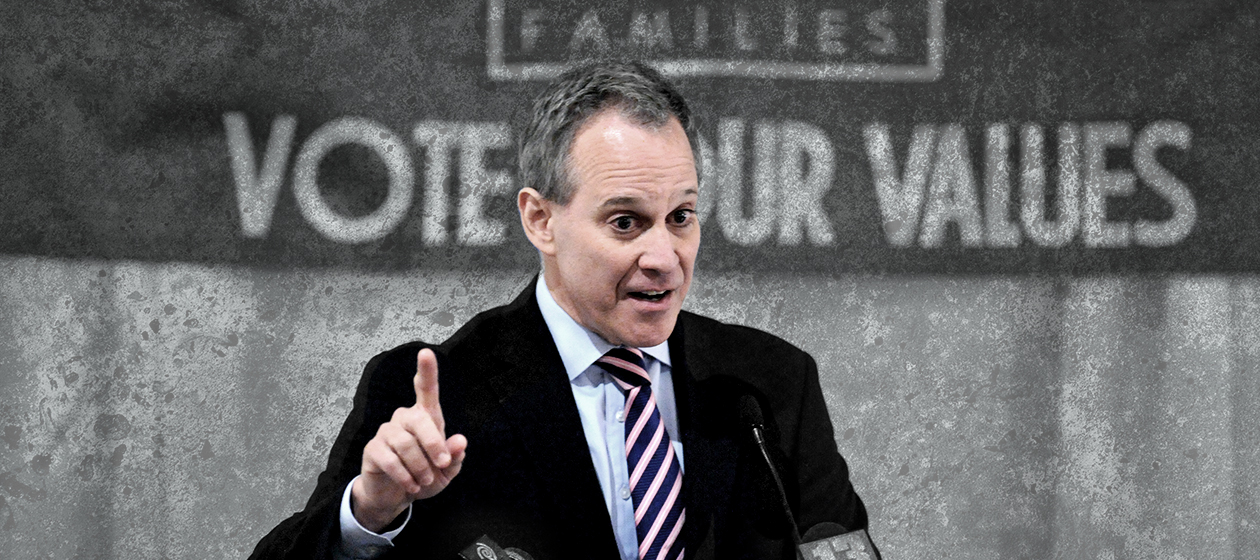The main lesson of Eric Schneiderman's loathsome hypocrisy
You can't tell someone's character from their professed politics


Here we go again.
The latest prominent male politician to fall after allegations of abusive behavior towards multiple women is Eric Schneiderman, New York's attorney general. In what no doubt reflects the seriousness of the allegations and the care with which they were reported, the Democrat's previously widespread support within the New York State political establishment evaporated instantaneously. Only hours after denying the accuracy of the reporting, and declaring his intention to fight for his political life, he was forced to resign.
As was the case with Eliot Spitzer — who vigorously prosecuted prostitution rings as attorney general, only to resign as governor when his own frequenting of prostitutes came to light — Schneiderman's hypocrisy was ostentatious. Schneiderman had sponsored a law making strangulation a crime, which eased prosecution for domestic violence; he led the legal campaign against Harvey Weinstein; and he vigorously promoted himself as a champion of the #MeToo movement. That this same man apparently had a history of beating his girlfriends has intensified the dismay of his former allies, and fueled the schadenfreude of his political enemies.
Subscribe to The Week
Escape your echo chamber. Get the facts behind the news, plus analysis from multiple perspectives.

Sign up for The Week's Free Newsletters
From our morning news briefing to a weekly Good News Newsletter, get the best of The Week delivered directly to your inbox.
From our morning news briefing to a weekly Good News Newsletter, get the best of The Week delivered directly to your inbox.
But does that hypocrisy actually matter?
In a very important sense, the fall of Schneiderman is an example of the system working. He was brought down by credible, well-sourced reports of actions that were both personally despicable and plainly illegal. Given his position as the chief law enforcement officer of the state, his alleged threats of further violence were an especially egregious abuse of power that justifies not only his removal from office but quite possibly prosecution. All of this would be equally true if his political views were diametrically opposed to what they actually are, and all of this would be equally true if the crimes he was accused of had nothing to do with the abuse of women.
Similarly, Schneiderman's pursuit of Weinstein is in no way discredited by his own alleged behavior, nor would we have any reason to reconsider the law making strangulation a distinct crime simply because its author has been accused of abusively choking his girlfriends. He is discredited, not because he contradicted his stated convictions, but because he acted in ways incommensurate with the responsibilities of the office. If he's hoisted by his own petard, that's not the grenade's fault.
The main lesson of Schneiderman's hypocrisy is simply that you can't tell someone's character from their professed politics. That's a lesson we seem to need to learn over and over again, not only in political life but in private life. On both the left and the right, many people want politics to serve a kind of tutorial function. The law says what's right and wrong, and by standing for right and against wrong you teach people to do right and not do wrong. It's notable that Schneiderman's accusers say they were blindsided by his actions in part because of his political stances, and that not only his power but also his prominent championing of women's causes made them hesitate for a time before coming forward.
But inasmuch as the law has a tutorial function, it is dangerous to personalize it in this way. Politics attracts deeply troubled individuals, and makes it all too possible for them to indulge in their worst pathologies, whether self-destructive or violent to others or both. Quite often, those same people then use their official rectitude as a shield against scrutiny, heightening the contradiction between their behavior and their professed beliefs. And so, voters go through this repeated process of heartbreak.
It's enough to make one never want to fall in love again — and in politics, that's probably a good thing. Rather than retreat into cynicism, though, we should be realistic. Character does matter in politics — enormously so. We are a government of laws, but those laws are administered by human beings, and if those human beings are corrupt, or emotionally unstable, or, worse, consider themselves to be above the law, then we have a problem.
But politics matters as well. Precisely because they both matter, and because they matter for different reasons, we need to be able to define questions of character in a way that is distinct from the way we assess agreement with the "proper" line. We need to make distinctions between offenses that are flat-out disqualifying and those that deserve political adjudication via the electoral system.
And if your enemies crow that your champion has fallen? Well, a good cause will not lack for champions, and the cemeteries are full of indispensable men.
Sign up for Today's Best Articles in your inbox
A free daily email with the biggest news stories of the day – and the best features from TheWeek.com
Noah Millman is a screenwriter and filmmaker, a political columnist and a critic. From 2012 through 2017 he was a senior editor and featured blogger at The American Conservative. His work has also appeared in The New York Times Book Review, Politico, USA Today, The New Republic, The Weekly Standard, Foreign Policy, Modern Age, First Things, and the Jewish Review of Books, among other publications. Noah lives in Brooklyn with his wife and son.
-
 The JFK files: the truth at last?
The JFK files: the truth at last?In The Spotlight More than 64,000 previously classified documents relating the 1963 assassination of John F. Kennedy have been released by the Trump administration
-
 'Seriously, not literally': how should the world take Donald Trump?
'Seriously, not literally': how should the world take Donald Trump?Today's big question White House rhetoric and reality look likely to become increasingly blurred
-
 Will Trump's 'madman' strategy pay off?
Will Trump's 'madman' strategy pay off?Today's Big Question Incoming US president likes to seem unpredictable but, this time round, world leaders could be wise to his playbook
-
 Democrats vs. Republicans: who are the billionaires backing?
Democrats vs. Republicans: who are the billionaires backing?The Explainer Younger tech titans join 'boys' club throwing money and support' behind President Trump, while older plutocrats quietly rebuke new administration
-
 US election: where things stand with one week to go
US election: where things stand with one week to goThe Explainer Harris' lead in the polls has been narrowing in Trump's favour, but her campaign remains 'cautiously optimistic'
-
 Is Trump okay?
Is Trump okay?Today's Big Question Former president's mental fitness and alleged cognitive decline firmly back in the spotlight after 'bizarre' town hall event
-
 The life and times of Kamala Harris
The life and times of Kamala HarrisThe Explainer The vice-president is narrowly leading the race to become the next US president. How did she get to where she is now?
-
 Will 'weirdly civil' VP debate move dial in US election?
Will 'weirdly civil' VP debate move dial in US election?Today's Big Question 'Diametrically opposed' candidates showed 'a lot of commonality' on some issues, but offered competing visions for America's future and democracy


